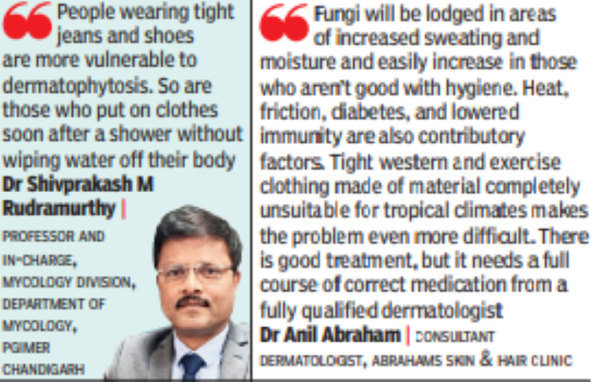Infection
Fungal skin infections rising, not responding to usual drugs: Docs | Bengaluru News
BENGALURU: Chittaranjan Das (name changed), 37, who wears shoes every day, was flummoxed when he had severe itching between the toes of his right foot. He also noticed small red patches in the great toe area, which increased in size in the next few days. As the symptoms worsened, he asked a friend for advice and got an ointment from a pharmacy.
It seemed to help initially, but after two weeks, the patches resurfaced involving the sole. He visited a dermatologist, who examined him and took samples for tests, last month.
“The sample was positive for a fungus affecting the skin (dermatophyte) which was resistant to the routinely used antifungal preparations. He was reassured on the management protocol and advised on care of the foot, including footwear, socks, etc. He required treatment with specific oral antifungal agents for almost eight weeks and was monitored for recurrence,” said Dr Jayanthi Savio, professor and head, department of microbiology, and principal investigator, ICMR South Zone AMDRC, St John’s Medical College. Dermatophytosis, an infection caused by fungi, is becoming increasingly prevalent.

“The incidence of fungal infection of the skin has increased significantly. Patients are coming with extensive, resistant fungal infection that covers large areas of the body and does not respond to regular medication,” said Dr Anil Abraham, consultant dermatologist, Abrahams Skin & Hair Clinic, Bengaluru.
He said he used to see at least 2-3 fungal infection cases every day in his 30 years of practice, but now the number has gone up to 8-10. “More importantly, they are severe, spread all over the body and respond poorly to mild or usual medication,” he said. Dr Govind S Mittal, founder, director and consultant dermatologist, Therapeia Skin Hair and ENT Centre, Bengaluru, said, “The prevalence of patients with recurrent dermatophytosis has definitely increased tremendously in the last 7-8 years. That there have been at least 30-40% more than the usual number of cases can be a safe number to say for the last eight years. More importantly, multiple members of the same family are not getting cured easily and are not responding to short courses of antifungals. The abuse of over-the-counter creams and steroid containing creams given by friendly medical stores has also been a big menace to deal with.”
“People wearing tight jeans and shoes are more vulnerable to dermatophytosis,” according to Dr Shivprakash M Rudramurthy, professor and in-charge, mycology division, department of mycology, PGIMER Chandigarh. So are those who put on clothes soon after a shower without wiping water off their body, he added.
Drug resistance against routinely used antifungals may cause treatment failure even in easily manageable cases of dermatophytosis, thus requiring chronic and prolonged treatment, said Dr Savio.
Avoiding self-medication and timely consultation with experts can help prevent drug resistance to a large extent. “The other area which requires to be explored is the use of antifungals in agriculture and animal husbandry and their role in development of resistance,” she added.

